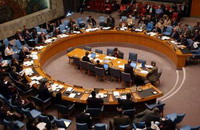UN Security Council ready to apply new set of sanctions to Iran
The U.N. Security Council will implement a third set of sanctions if Iran fails to answer key questions on its nuclear program.

The Foreign Office said diplomats from the U.S., Russia, China, Britain and France agreed, along with Germany, to come up with a new sanctions resolution with the aim of voting on it if November reports by the European Union and the International Atomic Energy Agency do not show improved Iranian cooperation.
Russia and China did not comment, and the agreement seemed at odds with weeks of public opposition, primarily by the Kremlin, to new sanctions against Iran.
Still, a senior diplomat from one of the six nations meeting in London suggested Russia's statements on the issue were not necessarily a reflection of its "determination, along with the other five (countries) to prevent an Iran armed with nuclear weapons." He spoke to The Associated Press on condition of anonymity because he was not authorized to speak to the media on the issue.
A senior Security Council diplomat at U.N. headquarters in New York said the five permanent members have not yet agreed on sanctions to be included in the new resolution. The diplomat spoke on condition of anonymity because discussions are continuing.
Friday's agreement seemed to reflect earlier consensus among the six about the possibility of new sanctions.
In talks Sept. 28 in New York, U.S. Secretary of State Condoleezza Rice and her counterparts from the other permanent Security Council member nations plus Germany also agreed to wait for those reports - and to consider new sanctions only if they showed Iran uncooperative and defiant on its nuclear obligations to the Security Council and the IAEA.
IAEA head Mohamed ElBaradei will report to the U.N. on Iran's compliance with its pledge to clear up all unanswered questions on past nuclear activities - most of them clandestine until unveiled four years ago. EU chief negotiator Javier Solana is also due to submit a report on whether Iran is ready to heed Security Council demands that it suspend uranium enrichment - a potential pathway both to generating nuclear power and creating the fissile core of warheads.
Iran has repeatedly said it would not freeze enrichment and IAEA officials have privately said Tehran is expanding the program.
Solana's report will likely contain no surprises in confirming that the Islamic republic continues to defy the council. But the IAEA report on how far Iran has gone in fully revealing its nuclear past will likely be more controversial, possibly pitting Russia and China against the United States, Britain and France over interpreting whether Tehran has gone far enough.
But even if the world powers ultimately agree on the need for new sanctions their imposition could be months away, judging by past bickering that pits Moscow and Beijing against their Western Security Council partners about how harsh such punishments should be.
The diplomats who met in London on Friday will hold talks again on Nov. 19 to assess the pending reports, a Foreign Office spokesman said.
He said the Security Council members and Germany had agreed to "finalize a text for a third U.N. Security Council Sanctions resolution with the intention of bringing it to a vote in the U.N. Security Council unless the November reports of Dr. Solana and Dr. ElBaradei show a positive outcome of the efforts."
U.S. Undersecretary of State Nicholas Burns had urged China and Russia to support harsher U.N. sanctions, saying the two nations were key to a diplomatic solution to the standoff.
"The U.S. believes very strongly there is a need to accelerate the diplomacy, to strengthen the sanctions," Burns told The Associated Press.
"We want a diplomatic solution, we do not want to give up on diplomacy, but we need the help of the P5 (permanent Security Council member) countries to do that, particularly the support of Russia and China."
The U.S. and its allies accuse Iran of using a civilian power program as cover to develop nuclear weapons. Iran denies the charge and insists it needs the technology to generate power.
Britain and France have backed the U.S. call for a resolution on a third round of U.N. Security Council sanctions if Iran continues to refuse to suspend uranium enrichment.
Burns said the U.S. believes China has increased trade with Iran in the last six months, sending the wrong signal about the international community's attitude toward the nuclear program.
Iran's former president, Hashemi Rafsanjani, said Friday in Tehran that talks between Iran and the U.N. nuclear watchdog were making progress and he warned the U.S. to avoid resorting to threats.
Burns said participants at Friday's meeting in London did not discuss an offer from Saudi officials to create a Middle East consortium of users of enriched uranium.
The proposal by the Arab nations around the Persian Gulf is to build a uranium enrichment plant in a neutral country to supply the region's states, including Iran, with reactor fuel for nuclear energy programs.
Burns said Washington would look carefully at the offer, but stressed a similar proposal from Russia - to host Iran's uranium enrichment facilities on its territory to allay Western concerns about monitoring - had been ignored.
Subscribe to Pravda.Ru Telegram channel, Facebook, RSS!


